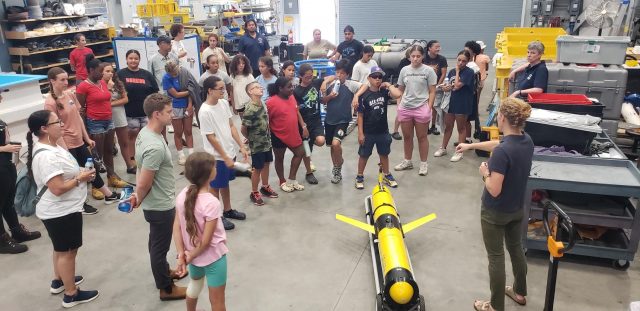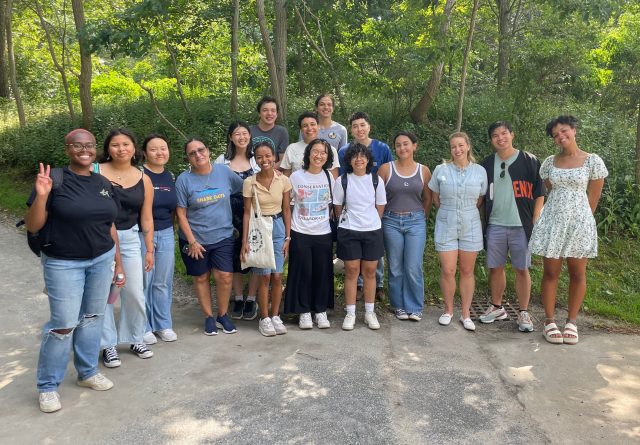Summer Science Tours: CGSN Engages Young Environmentalists
The U.S National Science Foundation (NSF) OOI Coastal and Global Scale Nodes (CGSN) Team at WHOI has had a busy summer of talks and tours. With the help of Mashpee Wampanoag WHOI Tribal Liaison and Native Land Conservancy (NLC) founding board officer, Leslie Jonas, CGSN hosted two notable sets of visitors in July and August 2024. The NLC is an Indigenous-led land conservation nonprofit based on Cape Cod that seeks to preserve land for future generations.
As a part of their Preserving Our Homelands (POH) summer science program, a group of students from the Mashpee Wampanoag tribe visited WHOI on 18 July. The POH program provides 6th, 7th, and 8th grade native students with hands-on science experiences in order to deepen their understanding of the environment from a western science perspective and its relationship to tribal culture, and traditional ecological knowledge. Their visit included a stop at the LOSOS facility, where CGSN team members talked about the scientific and technical aspects of the OOI program and provided an opportunity to see ocean observing technology up close. CGSN is grateful to WHOI engineer Ben Weiss and Sea Grant Marine Educator, Grace Simpkins, for organizing the visit and looks forward to ongoing interactions with the POH program.
Before the excitement from the POH tour had died down, a second group of visitors was hosted in early August. The group was made up of about 20 members of the Black, Indigenous, and People of Color (BIPOC) environmental science community. This included the NLC Executive Director, Diana Ruiz, and thirteen members of the Massachusetts Audubon Society and four NLC First Light Fellows. First Light is a paid summer fellowship program for rising Native American conservationists ages 18-25. With mentors from Mass Audubon, Fellows develop individual projects with topics in areas of ecological research, wetland restoration, water quality or land protection that build career skills and advance the NLC’s work. The fellowships combine indigenous culture, environmental sciences, and career development in order to open up career pathways. The four Indigenous Fellows who visited WHOI are studying at Brown, Yale, and Salish Kootenai College and got exposure to real-world instrumentation and engineering tools used to address pressing questions in ocean science research.
Read more about the NLC Fellows.

WHOI Senior Engineering Assistant Diana Wickman discusses the operation of an OOI ocean glider with Mashpee Wampanoag POH visitors. Photo credit J. Lund.

The August group included Native Land Conservancy First Light Fellows and members of the Massachusetts Audubon Society. Photo credit: L. Jonas.
